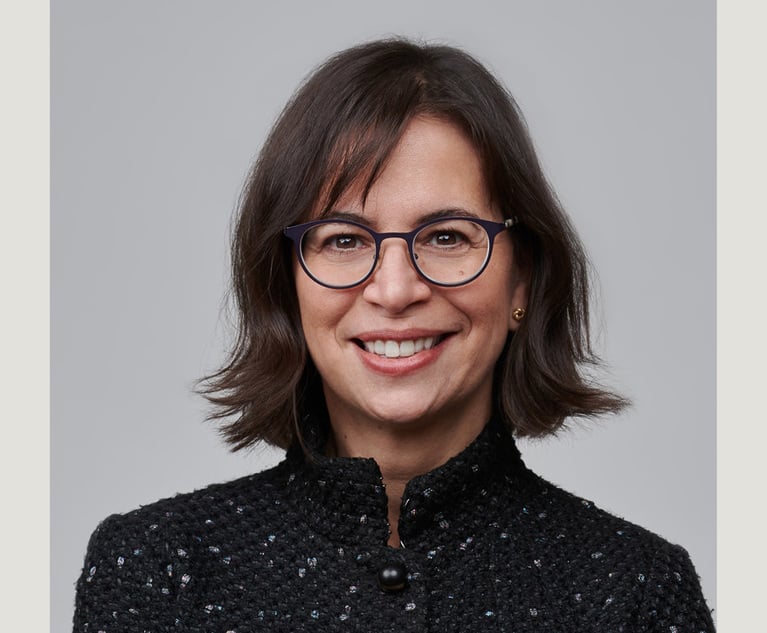Daily Dicta: Why 23 Beer Drinkers Can't Un-Do a $107B Merger
It's one of the quirkier corners of antitrust law: Private plaintiffs can sue to block mergers. But extracting a settlement is another matter.
August 09, 2018 at 01:34 PM
7 minute read
 Cold mug of beer.
Cold mug of beer.
“Consumers' allegations do not belly up to this bar.”
You gotta love it when judges make little jokes, as U.S. Court of Appeals for the Ninth Circuit Judge M. Margaret McKeown did Wednesday in roundly rejecting a challenge to beer maker Anheuser-Busch InBev's acquisition of SABMiller in 2016.
The case illustrates one of the quirkier corners of antitrust law: Private plaintiffs under Section 16 of the Clayton Antitrust Act can sue to block mergers.
That's right—why armchair-quarterback the Justice Department or Federal Trade Commission when you can bring your very own antitrust suit?
Of course, private plaintiffs almost never succeed, but every now and then, they'll walk away with a handsome settlement—or at least some nuisance-value crumbs.
 Not this time.
Not this time.
Lawyers for Anheuser-Busch InBev from Cravath, Swaine & Moore came out of the gate swinging, calling the complaint “the latest in a long line of attempts by plaintiffs' lead counsel, the Alioto Law Firm, to obstruct pending mergers by filing baseless challenges to high-profile transactions.”
Indeed, plaintiffs lawyer Joseph Alioto (a member of a prominent San Francisco clan—his father was mayor from 1968 to 1976) got sanctioned by the Ninth Circuit in 2013 when he sued to stop the merger of Southwest and Air Tran. The appeals court ordered him to pay defendants $67,495 after the airlines' lawyers from Skadden, Arps, Slate, Meagher & Flom accused him of “unreasonable and vexatious” litigation.
In the current case, Alioto represented a group of beer-drinking plaintiffs who feared post-merger “that prices for beer may increase, quality may deteriorate, availability may be lessened, actual and potential competition and the benefit of competition may be curtailed or even eliminated, and consumer choice may be destroyed.”
(Side note: We're talking about the makers of Budweiser and Miller. In a blind taste test, could you even tell them apart? But I digress.)
The beer drinkers asked the court to un-do the whole $107 billion merger, which Cravath partner Yonatan Even in court papers argued would be just a tad drastic.
“[T]here is no harm that could be sustained by these 23 beer consumers that would outweigh the harm to hundreds of thousands of employees and shareholders of not just ABI, but also Molson, Asahi and others, that would flow from an unwinding of the transaction,” Even wrote.
Not to worry. The Ninth Circuit panel, which also included Judge Richard Paez and U.S. District Judge Cynthia Bashant sitting by designation from the Southern District of California, did not seem to find it a close call.
They zeroed in on a fundamental problem with the argument.
As a condition of approving the merger, DOJ required U.K.-based SAB to divest its entire domestic beer business—a joint venture with Molson Coors. That business (known as MillerCoors) was spun off to Molson.
Which meant the merger between ABI and SAB didn't actually increase concentration in the U.S. beer industry. It stayed exactly the same.
“The challenged transaction did not increase ABI's market share because ABI acquired no interests in the United States,” the panel noted. “SAB did not compete in the market before the transaction except as MillerCoors, and MillerCoors still competes in the market.”
The plaintiffs also tried to argue that the deal eliminated SAB as a “potential competitor.”
Um, no.
“[B]efore the transaction and divestiture, SAB was an actual competitor through its joint venture MillerCoors.”
While this case fell flat, Alioto fared better in another recent challenge—targeting Alaska Airlines' acquisition of Virgin America. (A combination which I personally mourn—I loved Virgin, with its purple lighting, funny safety videos and on-demand entertainment.)
The case settled on confidential terms in late 2016 after U.S. District Judge William Alsup in San Francisco greenlighted the case for trial and ordered the airlines to give the court seven day's notice before closing their deal.
On Appeal, Latham Locks Up Win for Dubai Bank
Latham & Watkins litigators sealed a mega-win for Emirates NBD Bank in a trade secrets case, persuading the Ninth Circuit to affirm a 2016 jury verdict.
Emirates was sued by InfoSpan Inc., which claimed the Dubai-based bank stole proprietary technology for a system to allow foreign workers to easily and cheaply send funds back to relatives in their home country. Represented by Boies Schiller Flexner's William Isaacson, the company wanted more than $500 million in damages.
I wrote about the case at the time. Isaacson in his closing played to the jurors' sympathies for a plucky American entrepreneur. “This was about hard work and what happens when your work is destroyed and taken, how you're entitled to be treated under the laws of the United States,” he told the Orange County, California federal jury two years ago.
But Latham's Kathryn Ruemmler systemically dismantled InfoSpan's case. “There are at least five fatal flaws … and any one of those alone sinks his case. Any one,” she said, according to the transcript.
The jury found across the board for Emirates.
InfoSpan appealed, to no avail. In an unpublished memorandum disposition, the Ninth Circuit panel found InfoSpan was “not prejudiced by the adverse evidentiary rulings and the jury was properly instructed.”
“In contrast to the voluminous evidence establishing the Bank's defense, the allegedly prejudicial evidence was thin and briefly touched upon in the course of a ten-day trial,” the panel found. “Accordingly, even assuming the trial court erred in its evidentiary rulings, any errors were 'more probably than not harmless.'”
The Latham team on appeal included partners Dan Schecter and Michael Bern and associate Nima Mohebbi.
What I'm Reading
GOP Congressman Chris Collins Charged in Insider Trading Conspiracy
A criminal mastermind he is not.
In Formal Grievance, Immigration Judges Say Their Independence Is 'Under Siege'
The immigration judges' union protests DOJ's “deliberate encroachment on a judge's decisional independence to secure a particular result in violation of all applicable rules, regulations and laws.”
Federal Judge Skeptical of Groupon's Attack on Closely Watched Patent Infringement Verdict
But U.S. District Chief Judge Leonard P. Stark also said his “inclination is not to grant enhanced damages” to IBM.
New Manafort Trial Witness Renews Spat Between Judge, Prosecutors
“Judges should be patient. They made a mistake when they confirmed me,” Judge T.S. Ellis III said to courtroom laughter.
Attorney-Client Dispute Delays Ex-King & Spalding Associate's Suit Against Firm
One source of disagreement between ex-King & Spalding associate Joffe and his lawyers is a demand on Joffe's part that any settlement with the firm should require K&S to create an ethics program. (But also, he's behind on paying his legal bills.)
11th Circuit Blasts Lawyer's 'Shotgun' Lawsuit as Frivolous 'Garbage'
“Put colloquially: garbage in, garbage out,” Judge Gerald Tjoflat wrote. “Tolerating such behavior constitutes toleration of obstruction of justice.”
This content has been archived. It is available through our partners, LexisNexis® and Bloomberg Law.
To view this content, please continue to their sites.
Not a Lexis Subscriber?
Subscribe Now
Not a Bloomberg Law Subscriber?
Subscribe Now
NOT FOR REPRINT
© 2025 ALM Global, LLC, All Rights Reserved. Request academic re-use from www.copyright.com. All other uses, submit a request to [email protected]. For more information visit Asset & Logo Licensing.
You Might Like
View All
Litigators of the Week: The Eighth Circuit Knocks Out a $564M Verdict Against BMO in Ponzi Case

Litigators of the Week: Second Circuit Tells Argentina to Turn Over More Than $300M to Bondholders

How One of the World's Largest Institutional Investors Approaches Litigation

Big Law and Litigation Finance Seem to Be Having a Moment
Trending Stories
Who Got The Work
J. Brugh Lower of Gibbons has entered an appearance for industrial equipment supplier Devco Corporation in a pending trademark infringement lawsuit. The suit, accusing the defendant of selling knock-off Graco products, was filed Dec. 18 in New Jersey District Court by Rivkin Radler on behalf of Graco Inc. and Graco Minnesota. The case, assigned to U.S. District Judge Zahid N. Quraishi, is 3:24-cv-11294, Graco Inc. et al v. Devco Corporation.
Who Got The Work
Rebecca Maller-Stein and Kent A. Yalowitz of Arnold & Porter Kaye Scholer have entered their appearances for Hanaco Venture Capital and its executives, Lior Prosor and David Frankel, in a pending securities lawsuit. The action, filed on Dec. 24 in New York Southern District Court by Zell, Aron & Co. on behalf of Goldeneye Advisors, accuses the defendants of negligently and fraudulently managing the plaintiff's $1 million investment. The case, assigned to U.S. District Judge Vernon S. Broderick, is 1:24-cv-09918, Goldeneye Advisors, LLC v. Hanaco Venture Capital, Ltd. et al.
Who Got The Work
Attorneys from A&O Shearman has stepped in as defense counsel for Toronto-Dominion Bank and other defendants in a pending securities class action. The suit, filed Dec. 11 in New York Southern District Court by Bleichmar Fonti & Auld, accuses the defendants of concealing the bank's 'pervasive' deficiencies in regards to its compliance with the Bank Secrecy Act and the quality of its anti-money laundering controls. The case, assigned to U.S. District Judge Arun Subramanian, is 1:24-cv-09445, Gonzalez v. The Toronto-Dominion Bank et al.
Who Got The Work
Crown Castle International, a Pennsylvania company providing shared communications infrastructure, has turned to Luke D. Wolf of Gordon Rees Scully Mansukhani to fend off a pending breach-of-contract lawsuit. The court action, filed Nov. 25 in Michigan Eastern District Court by Hooper Hathaway PC on behalf of The Town Residences LLC, accuses Crown Castle of failing to transfer approximately $30,000 in utility payments from T-Mobile in breach of a roof-top lease and assignment agreement. The case, assigned to U.S. District Judge Susan K. Declercq, is 2:24-cv-13131, The Town Residences LLC v. T-Mobile US, Inc. et al.
Who Got The Work
Wilfred P. Coronato and Daniel M. Schwartz of McCarter & English have stepped in as defense counsel to Electrolux Home Products Inc. in a pending product liability lawsuit. The court action, filed Nov. 26 in New York Eastern District Court by Poulos Lopiccolo PC and Nagel Rice LLP on behalf of David Stern, alleges that the defendant's refrigerators’ drawers and shelving repeatedly break and fall apart within months after purchase. The case, assigned to U.S. District Judge Joan M. Azrack, is 2:24-cv-08204, Stern v. Electrolux Home Products, Inc.
Featured Firms
Law Offices of Gary Martin Hays & Associates, P.C.
(470) 294-1674
Law Offices of Mark E. Salomone
(857) 444-6468
Smith & Hassler
(713) 739-1250






